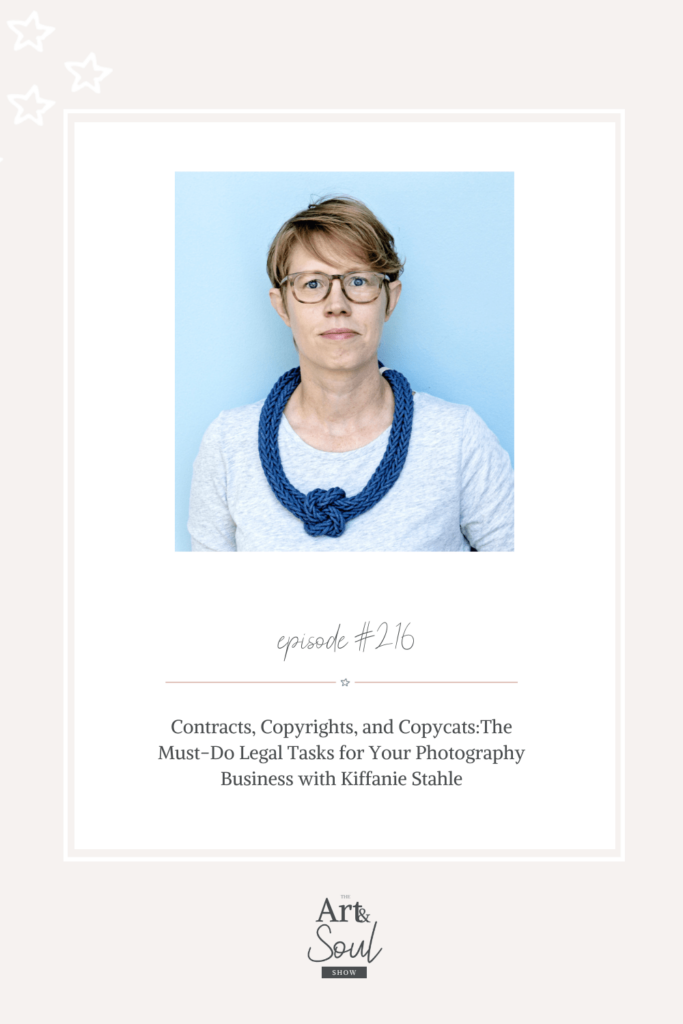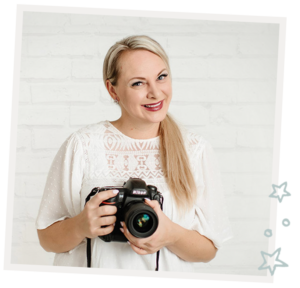Contracts, Copyrights, and Copycats: The Must-Do Legal Tasks for Your Photography Business with Kiffanie Stahle
As creatives, the legal tasks that come with running a photography business can be really intimidating for us. What protection do we need? Can we just use a contract from the internet? What do we do when someone steals our photographs?!

Well, in today’s episode, I’m chatting with Kiffanie Stahle to answer all your burning legal questions and hopefully ease some of your fears around the legal process! Kiffanie is so gracious and takes her time explaining exactly what we need to know about contracts, copyrights, liabilities, and payment policies. She makes it all so approachable as she shares specific stories from her clients and her own life to give us context on the legalese of it all.
She also shares some incredible business advice in her lightning round and introduces us to her dog, Ozzy (who sounds adorable!)
If you’ve been avoiding some of the legal tasks in your business because it’s felt too overwhelming, this episode is for you! Let’s dive in!
What’s in this episode:
- [02:43] How Kiffanie created the magical life she is currently living in her RV
- [05:00] Why contracts aren’t as scary as creatives make them seem, but why you should still have a lawyer create a custom one for you
- [10:24] The kinds of clauses and additions you do –and don’t– need in your photography contract
- [18:34] Everything you need to know about protecting your copyrights as a small business photographer
- [33:07] What photographers should know when writing their pricing and payment policies
- [39:24] How photographers can protect themselves from liability in a variety of situations
- [43:55] The double-edged sword of social media for photographers
- [47:48] Kiffanie’s lightning round, including some really creative business advice she has to share
Tune in to this episode to learn about the must-do legal tasks for your photography business to set yourself up for success!
SUBSCRIBE: Apple Podcasts | Spotify
Meet Kiffanie Stahle
Kiffanie Stahle AKA Kiff is the friendly legal eagle behind the Artist’s J.D. A place designed to add ease to the legalese of running your creative business. She is a firm believer that you can protect your ass(ets) without legal confusion. When she’s not geeking out on the law, you can find her and her pup Ozzy puttering around the western United States in their travel trailer. Her #1 priority these days is to make time for simple joys. So this means lots of time hiking, mountain biking, birdwatching, knitting, working on her National Park cross stitch collection, or badly singing while playing the ukulele around the campfire.
Connect with Kiffanie
Connect with Kiffanie on LinkedIn
Did this episode make you rethink how you approach the legal aspect of your business? Check out this episode The Fine Print: Legal Tips Every Photographer Should Know with Paige Griffith from the Legal Paige who shares even more legal advice for your photography business!
Transcript
[00:00:00] Kiffanie Stahle: So contracts get a really bad rap. They kind of are seen as this thing. We’re lording over clients of this thing of like, it’s my way or the highway, you know, and that’s because we encounter a lot of bad contracts, but I want you to think about contracts as a gift. You’re giving to your clients. You’re telling your clients.
[00:00:18] I’m a professional. You came to me because you want this end product that you’ve seen on my website. And the way we’re going to get here is following this process. And the contract is just going to outline. This is what it takes to have a smooth working relationship. You want these gorgeous photos at the end.
[00:00:36] This is what we have to do to get there.
[00:00:42] Lisa DiGeso: Welcome to the Art and Soul Show, where we dive into heart opening chats on photography, business, life, and that messy in between. I’m your host, Lisa DiGeso, a mom, a photographer, and entrepreneur, and I’ll be sharing honest conversations and advice for photographers with [00:01:00] insight on mindset, entrepreneurship, and creativity.
[00:01:03] The goal of this podcast is for you to be able to gain insights and strategies that will get you real results. Because let’s face it, having a photography business can be lonely. But it doesn’t have to be. This is the place you can go when you need a boost of encouragement, a kick in the pants, and inspiration to pick up your camera.
[00:01:23] This is the Art and Soul Show. Hello my beautiful friends. Welcome back to the show. Today I’m super excited to dive into today’s conversation with Tiffany Staley. Kip is the first Friendly legal eagle behind the artist, JG, a place designed to add ease to the legal ease of running your creative business.
[00:01:41] She’s a firm believer. You can protect your assets without legal confusion, which he’s not geeking out on the law. You can find her and her pup. Aussie, puttering around the Western United States in their travel trailer. Her number one priority these days is to make time for simple joys of life. So this means lots of time hiking, mountain [00:02:00] biking, bird watching, knitting, working on her national cross stitch collection, or badly singing while playing the ukulele around the campfire.
[00:02:08] I love that.
[00:02:09] Kiffanie Stahle: So great. It’s a lot, you know, like I, I really have failed at life that I get to work for myself and just travel around in my RV with my dog. It’s just, you know, I, I, I don’t know what I did wrong. That sounds like winning. Yeah. Yeah. I
[00:02:22] Lisa DiGeso: don’t love it. I’m so proud. I love that bio because it’s so all encompassing.
[00:02:27] It’s not like, I know I, I interview so many people on the podcast, but I love that you have so many diverse interests and you’re looking at the simple joys in life because I think a lot of the time we get so business, business focused that we forget to take our heads up and say, you know what, is this actually the life I want to be living?
[00:02:42] So,
[00:02:43] Kiffanie Stahle: and that’s actually exactly why I moved into my RV full time was because I felt like, you know, I was living before in California, which is a very expensive place to live. And you know, the nuts that you have. To earn every month in order to just survive is a lot higher. And, you [00:03:00] know, so I sold, I downsized, I moved into my RV.
[00:03:03] It’s a very simple life, which also means that I don’t have to work as hard to pay for my expenses, to put money into retirement, to do all of those kinds of things, and still make it a lot easier to, to make those time to do all that fun stuff and to really have a good life. Good work like that. I love that.
[00:03:21] I’ve kind of settled on a word of a year for of ease for a lot of years now and it’s like every year I just dive in deeper to like how can we inject ease into these different things. Yeah.
[00:03:32] Lisa DiGeso: I love that. I love that so much. So and I want to talk about ease when it comes to legal because that is so confusing and probably one of the biggest areas that photographers kind of get mucked up on.
[00:03:45] because either they’re not doing what they’re supposed to or they’re burying their heads in the sand thinking it’s very complicated and they don’t want to talk about it. So on this show today we are diving in to talk about all the legal stuff and I love that you make it not overwhelming because I [00:04:00] think that’s what happens.
[00:04:01] Kiffanie Stahle: Yeah, well I think that’s either one of two things. Either people get head in the sand or people go hog wild and do things that are Unnecessary for the stage they are in their business
[00:04:13] Lisa DiGeso: and
[00:04:14] Kiffanie Stahle: end up wasting time and energy and resources. Going down a path of things that actually don’t make sense given what their goals are in their business or don’t make sense given where they, the stage they are or don’t make sense given, you know, all of those different kinds of things and they end up making it more complicated than it needs to be.
[00:04:34] Lisa DiGeso: Yeah. I love that. It’s, it’s so true. So I wanna talk about contracts because that’s probably like. Contracts is like, probably like the starting place where things can kind of go sideways or they just omit doing them or it’s just such legal jargon that they’re not even sure what to do. So, can you share maybe why legal contracts for family and portrait photographers, why they should have a lawyer draw them up and not one they just found on the internet?
[00:04:59] Kiffanie Stahle: [00:05:00] Yeah. So before we get to that, I want to change your mindset around contracts. So contracts get a really bad rap. They kind of are seen as this thing we’re lording over our clients of this thing of like, it’s my way or the highway, you know, and that’s because we encounter a lot of bad contracts. But I want you to think about contracts as a gift you’re giving to your clients.
[00:05:21] You’re telling your clients, I’m a professional. You came to me because you want this end product that you’ve seen on my website. And the way we’re going to get here is following this process. And the contract is just going to outline. This is what it takes to have a smooth working relationship. You want these gorgeous photos at the end.
[00:05:40] This is what we have to do to get there. So that we both are not unintentionally disappointing the other side because we had different understandings in our heads. So a contract is really there to get everybody on the same page by literally getting everybody on the same page of saying this is what it takes for our relationship to work [00:06:00] really smoothly.
[00:06:00] So when you think about contracts in that way, then there are a lot. Less adversarial. There are a lot less kind of that kind of thing. And so what you want your contract to do is just outline what the process looks like. And having a lawyer draw up your contract is great because A, it probably doesn’t cost as much as you think.
[00:06:23] Um, there are a lot of times that I see people selling template contracts for almost as much as I charged to create the contract for you. And having a lawyer drawn up for you is going to make sure that it matches your working style. So, you know, if you only do a certain kind of thing, then there could be in that template that you download all these clauses that aren’t relevant to what you’re doing.
[00:06:48] And so we’re adding maybe confusion to the relationship. We’re adding, you know, sections to the contract that don’t need to be there. And so a lawyer is going to help customize that contract to your working style, the [00:07:00] way you work with your clients, the things that you do, and also we’re going to make sure that it follows the laws of your state.
[00:07:06] So We live in the United States, which is great, but also means that like Illinois laws are different than California laws are different than Florida laws are different than these laws. And if you’re in another country, then your country’s laws differ than other countries laws. And so having a local lawyer, especially if you’re in the US, somebody in your state to draw up your contract is going to make sure that like the weird little nuances like One of the later questions that you sent me before brought up the difference between a deposit and installment.
[00:07:38] Those words mean different things in different states. And so making sure that you have the person who is going to know what the local rules are, that when we go to court to try to enforce this contract is actually going to hold up, um, is going to really help you. The other downside I see of a lot of internet contracts is that they’re Frankenstein [00:08:00] contracts.
[00:08:00] So they’re like, oh, I downloaded three templates, and I liked this part of this one, and I like this part of this one, and I like this part of this one, and so I combine them all together. And often, when I see those contracts, they’re referring to paragraphs that don’t exist, that are conflicting in paragraphs, and so you’re, Actually adding confusion and not doing what you want to do of making smooth working relationships.
[00:08:23] And so that’s the other kind of downside with a lot of internet contracts. Yeah.
[00:08:28] Lisa DiGeso: It’s funny because you see them being shared in groups too. So it’s like one that maybe someone Frankenstein together and they’re like, don’t worry, I have a contract. I’ll send it to you. And it’s just like, so you’ve got this contract that you don’t even know if is valid or legal or binding and you’re just hanging your whole business on it.
[00:08:44] Kiffanie Stahle: You know, like. Another benefit of having a lawyer draw one up for you is that lawyer can be there as a resource to be like, okay, so my client is asking this question. Like I thought I understood what this section of the contract is meaning, but my client is asking this question and they have a different [00:09:00] understanding.
[00:09:00] Like, are we aligned? Am I misunderstanding? Are they wrong? How do I explain it to them? All of those kinds of things. Like one thing I do when I create a contract for clients is I actually spend more than an hour on a zoom recording where we walk through sentence by sentence of the contract and they get the recording afterwards so that they can go back and reference that later of like, okay, wait, I do, I am remembering this right.
[00:09:25] This is what Tiffany said. And this is the strategy she said to talk about it with the client. If there have questions. So that’s another great benefit of having a lawyer on your team is to kind of help you when questions arise.
[00:09:39] Lisa DiGeso: And should there be a specific type of lawyer that you’re asking to be drawing up these?
[00:09:43] Kiffanie Stahle: Yeah. I mean, so ideally in the perfect scenario, you have someone who helps creative businesses, who’s the, you know, who, you know, understands the industry, understands what the norms are, all of those kinds of things. Depending upon [00:10:00] your state and your community, you might not have a lot of creative business specific lawyers.
[00:10:06] And so then you’re going to look for someone who’s small business specific, A for price point and B for that more personal kind of relationship.
[00:10:15] Lisa DiGeso: Love that. So are there any key elements that we should look for or that should be included or not included when you’re working with a lawyer? Again, we want
[00:10:24] Kiffanie Stahle: to think about like What the relation, what a perfect relationship is going to look like, like what are those elements that are necessary, like when payment is going to happen, when deliverables are going to happen, all of those, what they can do with the resulting photos, the schedule, like all of those common questions that clients are going to ask, you want to make sure it covers all of those things where situations could go wrong, you want to try to, or at least the most likely ones.
[00:10:50] We’re never going to, we don’t want a 50 page contract. So we’re not going to cover every wild scenario that could go wrong, but we want to cover the most common things that could go wrong. [00:11:00] You know, what happens, you know, this day and age with, if it’s a in person session, we need to have a public health clause in there.
[00:11:06] We need to have a limitation of liability section. If we have to cancel at the last minute because of a public health crisis or something like that. So we want to have those, um, Most likely things that are going to go wrong, and then what’s necessary for a smooth working relationship.
[00:11:23] Lisa DiGeso: Totally. What about injury prevention?
[00:11:25] Like, or, or, like, what if, what, yeah, what if someone, like, gets injured during your session? Should that be something that’s in the contract?
[00:11:31] Kiffanie Stahle: So, I always recommend a limitation of liability section in a contract. And what that section is designed to do is to say, If anything goes wrong, you know, that can include acts of God, that can include lost files, like what happens if you get, you know, you’re in an urban area, your camera gets stolen off of you right after you finish the photo shoot, like, you know, it can cover all of those kinds of things.
[00:11:55] It can cover, you know, damage to your computer with the files on them. It can [00:12:00] cover them getting injured. It can cover all kinds of things. A limitation of liability is very common in contracts and it says the maximum you can ever be awarded is this amount. So if anything goes wrong, like if I can’t show up, if it’s a wedding and I can’t show up and I can’t, my psychic shooter can’t show up, I call all my friends that I trust, they can’t show up, then this is the maximum that I owe you.
[00:12:23] And often that is like a full refund is kind of the standard, but that they can’t, you know, if they go and try to sue you in court, they can’t ever recover more than that. Yeah,
[00:12:32] Lisa DiGeso: I think that’s awesome.
[00:12:33] Kiffanie Stahle: I also would recommend for a liability standpoint, especially if people are coming into a studio that you own, that you have liability insurance, that you have that to help protect you.
[00:12:44] If you are doing going into venues, that’s going to be a requirement if you’re a wedding photographer and you’re going to venues, that’s going to be in the bride’s cut or the couple’s contract with the venue that you have that insurance and that they’re verifying you have that insurance. [00:13:00] So you’re going to need it.
[00:13:01] But it can also help, you know, if something were to happen, yes, you’re paying your deductible, but They’re gonna cover the rest.
[00:13:09] Lisa DiGeso: Yeah, that’s one thing because I I’m a maternity newborn photographer And so like from day one Handling someone’s bibbies like I a hundred percent agree And so when I hear like our students don’t or listeners don’t, I’m like, Oh my gosh, like you got to bring it, you got to, you got to get it.
[00:13:28] And
[00:13:28] Kiffanie Stahle: you know, like, again, it’s one of those things that oftentimes people assume cost more than it actually costs. Depending upon the kind of thing you’re doing, it actually might not be that expensive. It’s not that much. And it becomes a business expense. So say your policy costs. 200 a year, and you do 20 weddings a year.
[00:13:48] That’s just spread out. 10 per wedding goes towards that. And then you’ve got it covered. And so, you know, you just kind of have to account for that as a business expense and make sure [00:14:00] you’re accounting for that in your pricing as part of an expense.
[00:14:04] Lisa DiGeso: Yeah, I love that. So let’s talk a little bit about model releases in photography and maybe what should be included in those documents.
[00:14:11] Is this something that we should also have drawn up from a legal standpoint? So yeah, so a
[00:14:17] Kiffanie Stahle: model release is actually necessary for a whole set of laws that people don’t really understand very well, which is called the right of publicity laws. So these come about because we are saying that we as individuals should be able to control how our name, how our likeness, how our photograph, in some states our signature and our voice, especially those states with celebrities, can be used to help sell other people’s products or services.
[00:14:46] And so a model release is covering two things. One, it’s covering you being able to license those photos to somebody else. But two, it’s giving you permission to post those photos on your website, on your [00:15:00] social media accounts, in your portfolio, to take and sell your services to others. And so the right of privacy law, uh, publicity laws, say that you, as long as you have permission, Then you can do whatever you want.
[00:15:15] Model releases are the same thing. As long as you have, you know, as long as the model gives you permission to license those photos and sell them, then it’s okay. So I would say you only need a standalone model release when you don’t have an existing contract. If you have a contract with somebody, it should just be a paragraph in your contract.
[00:15:35] That’s a very simple model release. It says we’re giving permission for these photos to be used for all of these purposes. So you don’t really need a standalone model release if you’ve got a contract, you know, if you’re got a contract with the parent and we’re going to say this includes, you know, their child because they’re the one that can give permission for their child.
[00:15:56] With wedding photographers, it gets a little more [00:16:00] challenging because the couple obviously are signing the contract, but all their guests are not signing the contract. And so, you know, we, we have the release for the couple, but we’re not going to get a release for every single guest. So we just have to be thoughtful in how we use the photos with all of the guests in it to kind of, you know, try to have them not as visible as possible.
[00:16:22] You know, there have been some lawsuits in the past. You know, somebody goes to the wedding with their, not their spouse, and then it gets posted on social media, and then it becomes a whole to do because they just outed them for having an affair. And so, um, obviously those kinds of situations we can’t, we can’t protect ourselves from.
[00:16:44] But again, this is where things like liability insurance come into play of having that will help protect you when those kinds of situations happen. Interesting.
[00:16:52] Lisa DiGeso: But yeah,
[00:16:53] Kiffanie Stahle: but a model release can just be a simple, simple paragraph in your contract is really for most of us what’s necessary. [00:17:00]
[00:17:00] Lisa DiGeso: Now what if you have, say for example, you have a client, maybe someone who’s celebrity or someone who is like very well known, they want their images to to be private.
[00:17:10] They don’t want you to be able to use them. Is there something in that contract that should be like, this part is crossed out? Like, how would you deal with that? Yeah. So I would
[00:17:19] Kiffanie Stahle: just take that paragraph out. So, you know, oftentimes when I write clients for contracts, I give them options. So I give them the, like, this is the preferred model release, the full, you can do whatever you want with it.
[00:17:30] Then if we have clients who are concerned about privacy, then we have one that I can use it in my portfolio. I’m not going to post it online, but I can use it to show people, you know, privately in a password protected or whatever site that I have done this kind of work. So we have that one. And then we have the just remove it all if the client is really concerned.
[00:17:53] But it’s important to remember that this is completely separate from copyright. This is not impacting your copyright [00:18:00] whatsoever. This model release, this is just putting boundaries on what you can do to use these photos for marketing of your business because of this underlying law that says we have the right to control how our image is used to sell other people’s products and services.
[00:18:18] Lisa DiGeso: Interesting. I love that because I wanted to talk a little bit about copyright and copyright infringement issues because a lot of times you hear photographers have their work taken and it’s used without their permission. It can be used by companies and ads. So how would a photographer deal with that?
[00:18:34] Kiffanie Stahle: Yeah. So I think that, you know, like most things, I like to take a business first approach on this. Like there are times that these uses are actually beneficial to our business. So if it’s, you know, that it’s, we were at a wedding and the caterer is using our photos without our permission, then it’s reaching out.
[00:18:54] via an email, via social media with the caterer and not being accusatory, but being, [00:19:00] you know, just educational, like as another wedding professional, you might not know this. Um, this is the credit that I prefer anytime you work with me and how I want a link back to my website. Just, just want you to make sure that you have good relationships with all the other photographers that you work with, just a heads up kind of thing.
[00:19:16] So if it’s helpful to your business, then you want to, you know, go down the. And just the, let’s, let’s fix this situation.
[00:19:25] Lisa DiGeso: Yeah. I love that.
[00:19:27] Kiffanie Stahle: If it is something that is detrimental to your business, taking business away from you, it’s making it so that it’s harder for you to earn your living, the company kind of stealing things, then this is where it gets challenging in the United States.
[00:19:42] So the United States is kind of an outlier when it comes to copyright, that you have to register your copyright with the copyright office. In order to get the full benefits of the U. S. copyright. So, a lot of other countries are just, as soon as you create the thing, you [00:20:00] have your copyright, and you can enforce it however you want, as long as the copyright’s valid.
[00:20:04] In the United States, you have a copyright as soon as you click the shutter, or as soon as you Finish the image by doing the post processing. Um, whenever you consider the image is finished, you own the copyright, but to get the full benefits of the copyright act, you have to register it with the U S copyright office.
[00:20:22] And so the, the downside of not having a copy. An image registered with the U. S. Copyright Office when it is infringed is that the maximum you can ever be awarded is what you can prove your actual damages were from them using it, which often is just a, your normal licensing fee. And so, uh, There has been a very new process in the last several years in the United States where before your only option was going to go to federal court, which is incredibly expensive, so that wasn’t really an option.
[00:20:54] There is now a, the Copyright Office has what’s called Small Claims Court inside the Copyright Office where [00:21:00] you can file your claim there for these smaller infringements and they will handle it kind of out of court for a smaller cost. So you can go ahead and do that. If you have registered this image with the copyright office, then you can not only get your copycat to pay your attorney’s fees if you win, but you can also get what’s called statutory damages, which ranges from 250 on the low end, which is more of those scenarios of like, We thought we had a contract and it just really was, it wasn’t, wasn’t intentional.
[00:21:32] It was just kind of all a mix up kind of situation to, you know, the high end where it’s 250, 000 where it’s, you know, I was willful in like, I emailed you and said, I’m thinking about including your work. Please send me the high resolution image. And then they email you back. Oh no, we changed our mind. And then they go ahead and use it
[00:21:51] Lisa DiGeso: anyways.
[00:21:52] Kiffanie Stahle: So you’ve got that big range. Um, where you can get, and that’s where, you know, obviously the bigger money options [00:22:00] are with these bigger companies, because, you know, but if you haven’t registered, then really the small claims court is your best option.
[00:22:08] Lisa DiGeso: That’s really good advice. Another thing I’ve been hearing, and not often, but sometimes, is another photographer is taking your work and passing it off as theirs.
[00:22:18] So what do you do in that scenario?
[00:22:20] Kiffanie Stahle: Yeah, so in that scenario, again, the small claims court is probably your best option because they’re not having the financial resources to pay much for it. But I also would, again, in that instance, you know,
[00:22:35] Lisa DiGeso: Reach out. Reach
[00:22:35] Kiffanie Stahle: out. Yeah. Like, start with a conversation, you know, none of these and none of these should be your first missive is coming from the copyright small claims court.
[00:22:46] We should always have a conversation before we jump to that. Even if you were to hire an attorney, they would not go straight to small claims court. They would send them a cease and desist letter first and say, let’s try to resolve this. Yeah. [00:23:00] And so if it is another photographer, let’s reach out, let’s find out what it is.
[00:23:06] Why, what’s going on, you know, and explain like, I’ve worked really hard to build up this reputation and the style. And like, it’s coming back to me that you’re using my images, you know, we just, we need to stop it. And, you know, sometimes it’s just people who are actually not photographers who are just trying to make quick buck by getting people to pay the money online.
[00:23:27] And sometimes in those cases, you know. Another option when it’s an online only infringement is what’s called the Digital Millennium Copyright Act. So the DMCA is actually a safe harbor built in the Copyright Act. And it’s designed for the internet service providers. We were talking about how we’re in our mid 40s beforehand and we’re old enough to remember when we had things like Napster and we just illegally downloaded music.
[00:23:53] Not that I ever did that in my college days. Never! But, so this came about [00:24:00] to protect those internet service providers because they were the ones with the deep pockets. And so, the You know, so the studios were trying to sue like AOL and you know, all of those big service providers because they had the money.
[00:24:13] Us little college kids didn’t have any money to pay them for legally downloading music, but the internet service providers did. So it kind of created this safe Harbor where, um, if you fill out the form, if you fill out the required information and submit it to them and they take that down within a reasonable time, that stuff that was posted that’s infringing on someone’s copyright, then they cannot be sued.
[00:24:38] And so it provides, you know, so like Meta and Pinterest and every, you know, GoDaddy, all the Squarespace, all the hosting providers, as long as it’s hosted inside the United States, you can use that to take that content down. Now, the really truly bad actors are hosting it in the Eastern European bloc and those kind of places where it’s not the DMCA [00:25:00] does no good, but if it is hosted in any of those places.
[00:25:04] And if it’s on, on a Facebook property, on a Meta property, a Google property, you can use their forms to get it taken. Kind of to close out the DMCA. So they’ll take it down. The other party then has the opportunity to say, actually, no, I do have the rights to this content. And then if they say that they’re required to put it back up, and then your only outcome is to go to court and sue over it.
[00:25:30] I would say, I mean, I’ve submitted. I don’t even know how many thousands of DMCA’s 15 years. I’ve submitted a ton of them. I can probably count on two hands the number of times they have done what’s called the counter notice of saying that I actually do have the rights to this content. Usually it just goes down and it’s, and it’s done with, um, you know, there are a handful of like, and all of those The majority of those are the same exact host who just pretends [00:26:00] that the law doesn’t exist.
[00:26:02] Lisa DiGeso: Actually, I will share what, what’s kind of going on is there are these illegal sites that take creators who create online programs and online courses and they put them on the black market and they either sell them or they give them away for free. And it keeps happening. And it’s doing, it’s like more and more and more and it’s just getting, and I bet I know what site that is.
[00:26:20] Kiffanie Stahle: And that’s the site we were just talking about. Yeah. They’ve done it for several of my clients and you know, we submit them and they just ignore them. And, and unless we’re going to go to court.
[00:26:34] Lisa DiGeso: Yeah. Don’t have a
[00:26:35] Kiffanie Stahle: lot of other options.
[00:26:37] Lisa DiGeso: No, because they’re hosted in a different country. Yeah. And which, which, well, and there is, there is actually
[00:26:42] Kiffanie Stahle: one that has a U S It has a mirror in the U.
[00:26:45] S. and so we’ve attempted to get through that mirror, but yeah, but I think I know exactly who you’re talking about. It starts
[00:26:52] Lisa DiGeso: with a P. Uh huh. Yeah.
[00:26:54] Kiffanie Stahle: And, um, yes, I am lucky that none of my courses have ended up there yet, but. [00:27:00] Yep.
[00:27:00] Lisa DiGeso: Yeah. It’s really unfortunate and it’s, it’s so heartbreaking really because we worked so hard to create these amazing, this amazing content and to see someone who’s like selling it and, or giving it it.
[00:27:14] And you’ve worked, Yeah, it’s just, it’s really heartbreaking and it feels like, why am I doing this? Yeah,
[00:27:21] Kiffanie Stahle: so, and I mean, you know, like, there’s, you know, they never tell you when you go to law school that they should actually be putting you through therapy school at the same exact time because you end up being, you know, I’ve just learned over the years all these therapist tricks and luckily I have a client who’s an old therapist and so she used, she walked me through a bunch of things and gave me some resources to help.
[00:27:44] But, you know, and that’s, you know, sometimes when it comes to the copycats, especially when it comes to stuff like this, I had a client to, um, the Canadian laws, when it comes to useful objects are very different than they are in the United States. And I had a client [00:28:00] whose illustrations were taken by a Chinese company, put on mugs and sold exclusively in Canada.
[00:28:06] And they were like at like. The mass retailers like all over like tens of thousands of these were sold in Canada and because of the way that Canadian law works differently than U. S. law when it comes to useful objects, we’ve kind of really hit a brick road with trying to stop them and get remedies for doing this.
[00:28:29] And, you know, sometimes we have to have the conversations of like, you know, there’s a certain point that continuing to chase after these copycats or continuing to spend our mental bandwidth on them actually detracts from serving the people who already love us and who want to spend their money with us and the people who would spend their money with us if we could.
[00:28:51] Yeah. get ourselves in front of them. And so, you know, there comes a point where chasing after copycats becomes detrimental to your [00:29:00] business. And it’s actually not worth the time and energy and effort and financial resources to do so. And it’s unfortunate, but at the same time, like, It goes back to that balance.
[00:29:12] Like we have to, we have to figure out where that breaking point is for us. And when we hit it to say, okay, I just have to walk away from this. This makes me mad. This makes me frustrated. But I just have to put a blinder on it for now because it’s, it’s. It is what it is. It’s only going to. Yeah. Mm hmm.
[00:29:31] Lisa DiGeso: Yeah. It is what it is. And it’s, and it’s true because you have to, I, I always operate on the belief that there is more good than bad people in the world. And most people are honest and, you know, that’s how we find out about these things is because we have these honest people who tell us, right?
[00:29:45] Kiffanie Stahle: Yeah. Yeah.
[00:29:46] You know, living in my RV, you know, like I have actually gained so much more. faith in humanity. Like I have had so many experiences, like I was broken down on the side of the highway, like two lane farm road [00:30:00] in Wyoming. Within 10 minutes, I had three pickup trucks who were at my side, helping me like solve the problem.
[00:30:07] And because it was like later in the afternoon, all of them offered to let me camp on the property overnight, you know, like, yeah, this whole experience has really, you know, taught me that we actually are more good than what is portrayed. In the media, there are definitely some bad apples out there, but, you know, and I think that’s an important reminder, you know, when it comes to our contracts, when it comes to copycats, when it comes to a lot of these kinds of things, to.
[00:30:34] have the remembrance that these people might actually not know that what they’re doing, they’re not supposed to be doing. You know, like when it comes to your clients using your photos and acting like they own the copyrights, they’re doing that because they know copyright is not even on their radar.
[00:30:49] It’s not even something that’s part of their daily lives. And so they’re doing it totally unintentionally attempting to infringe on your rights. They’re just doing it because that’s what they [00:31:00] think they’re allowed to do. Yes. And they love your work and they want to share it and do it with you. Exactly.
[00:31:04] And they’re not trying to take money out of your pocket. And so I think when we kind of Attempt to approach these with kindness, and then find out. Attempt to approach with education, and then find out that, okay, we are really dealing with a matter. It’s, it’s better, because the vast majority of the time, it’s completely in either ignorance of the laws, or just
[00:31:31] Lisa DiGeso: I think one thing that we often see too in our groups is, or we hear about is, you know, you’ve edited the session and then your clients throwing an Instagram filter on it and then clients or photographers get quite upset that that’s going against their contract.
[00:31:45] So I think probably it, you would just message them, right? Yeah,
[00:31:49] Kiffanie Stahle: you know, message them. And. Sometimes clients are doing it because that’s the filter they put on everything and they want it to look exactly the same as everything else. And so, you know, again, it’s [00:32:00] just that education of like, you know, I, I love that you’re sharing.
[00:32:04] I love that you’re so excited about our session because I try to keep a very cohesive brand. You know, my preference is for you not to put this filter or if you’re going to use a filter, provide them three filters that are allowed to use or something like these are the filters that match most with my aesthetic kind of thing.
[00:32:23] So to give them options and to kind of just, this is, this is why.
[00:32:30] Lisa DiGeso: Um,
[00:32:31] Kiffanie Stahle: not a like, you can’t do that,
[00:32:32] Lisa DiGeso: but. Right? Yeah. I know, I’ve had my stuff filtered, and I’m just like, oh, that wasn’t what I was going for, but you know what? You know, and. You love it. You love it. They love it. They’re
[00:32:43] Kiffanie Stahle: happy. You know. They’re, you
[00:32:46] Lisa DiGeso: know.
[00:32:46] Kiffanie Stahle: And. if it does introduce you to, you know, another family that’s gonna come and hire you, then great, like, you know, and so, you know, again, that’s in the bucket of this is helping you. So yeah, it’s more important [00:33:00] that they provide you credit. It’s more important that they tag you in those, those photos, then a specific filter.
[00:33:07] Lisa DiGeso: Yeah, I agree. So let’s talk a little bit about pricing and payments, because that’s something we always hear about on Tik Toks and on the internet. So, pricing payment policy to avoid legal disputes with clients.
[00:33:21] Kiffanie Stahle: Yeah. So, one of the things we didn’t get to talk about earlier, which I’m glad we got an opening for it here, is, um, I like to have the format of contracts a little bit different than most attorneys.
[00:33:33] So I like to have what I call a cover page of a contract, and that’s those things that the client cares about, the things that are necessary to create a smooth working relationship. So on that cover page, we’re going to have things like the dates of the sessions, the dates of payments, what the payments are, how they can make them, what the rights are to the photos, like those important things for a smooth working relationship.
[00:33:59] [00:34:00] Those. This high level 10, 000 foot view things we put on the cover page and then the legal fine print goes on page two. and beyond. Hopefully just page twos and threes. We don’t probably need anything more than that. And then the client, A, it’s easy for the client to find those important things, when you need payment, how much it is, what methods you accept, what the dates are, what they can do with the photos, all right there front and center and easy for them to find.
[00:34:27] And we only have to turn to that legal fine print when the situation doesn’t work smoothly. It also makes it easier for you to update the contract because those things that get changed are on that front page. You don’t have to remember to search through and find and which option is it that I’m using this time and make sure that I’m making all of those changes so that we don’t, again, create unintentional disagreements within the contract.
[00:34:54] So, that is super helpful when it comes to pricing and payment because it makes it very [00:35:00] clear for the client. This is what it is. This is what it’s going to cost. And I always tell people when you’re putting your packages together. It’s almost as important to say what’s not included as what is included, you know, and bulleted lists are great.
[00:35:16] People scan and read bulleted lists, long paragraphs people do not read. And so, you know, on your, at the beginning of that cover page, this is what’s included number of photos, time sessions, all of those kinds of things, the output, the deliverables, what you’re giving them, all of those kinds of things. And if there are things that people.
[00:35:35] think might be included that are not included, then we say this service does not include and list out those kinds of things, especially if they’re add ons that you offer that the client declined or, you know, different parts of different packages that people might think overlap. Yeah, we want to make sure we’re spilling out that that’s not included, like what are the boundaries of what we can and can’t do for them for this price point.[00:36:00]
[00:36:00] So I think that that’s really helpful. We talked about briefly before the difference between an installment and a deposit. In some US states, a deposit must be refundable. If you call something a deposit, it cannot be found refundable. And so if you’re in one of those states, we want to call things installments.
[00:36:18] They’re making their first installment, not a deposit, because an installment through a liquidated damages clause, which I’ll explain in just one second, can mean that that money is permanently yours once you hit certain milestones in the contract. So a liquidated damages clause is one of my favorite contract clauses to protect you guys.
[00:36:39] And it basically says like, if you cancel, if things change, if the wedding, but I had someone a couple years ago who like two days before the wedding, the bride found out that the girl was cheating on her and they canceled the whole thing. If any of those kinds of things happen that. The, the money that they [00:37:00] have paid becomes yours, even though you don’t deliver your end of the bargain.
[00:37:04] So a liquidated damages clause requires very specific language to say that this is serving not as a penalty for the person for breaking their end of the contract, but because you work in a business that like, once you set aside that date. Two weeks past, you’ve turned people down for that date, you’re booked up.
[00:37:25] You’re not going to be able to refill that date, especially wedding photographers. Like, once, you know, once a certain point in time of the year hits, you’re booked up. And like, everybody else who’s getting married on May 20th already has a photographer. You’re not re booking that date. Um, and so a liquidated damages clause is saying, like, because we work in an industry where it would be hard to determine how much we’re harmed by you not fulfilling your end of the contract, we’re going to predetermine that this amount covers your [00:38:00] walking away from the situation.
[00:38:01] So it’s similar to, you know, if you’re familiar with editorial contracts, it’s similar to a kill fee. of like, if we decide to change direction, the kill fee compensates you for the work that you’ve already done. So it’s kind of similar to that, but it requires very specific language to be valid. And so that language, making sure you have the right language for, um, it to turn that installment into something that’s not refundable that becomes yours so many days before the session is very important to protect you because you’re not going to be able to rebook or the likelihood that you’re going to be able to rebook that is very small.
[00:38:39] Lisa DiGeso: What about the root retainer? So the word retainer can work.
[00:38:42] Kiffanie Stahle: I always prefer the word installment just because retainer again has in some states has the connotation that it’s would be refundable. It’s like, uh, you know, again, it’s kind of more similar in some states to the positive, like I’m putting this money forward and you’re supposed to be billing [00:39:00] against it, or you’re supposed to be subtracting from it when certain things happen.
[00:39:03] And so the installment language from a legal standpoint, Is the preferred language.
[00:39:10] Lisa DiGeso: Hmm. Interesting. Love that. Learning so much stuff. All right. So we talked a little bit about liability and protecting themselves. So probably liability insurance would be definitely recommended. Yes.
[00:39:24] Kiffanie Stahle: So one of the kind of standard things that I teach is the five must do legal tasks for your creative business.
[00:39:31] And number four is getting liability insurance. Number five is writing your contract. So number four, definitely having business liability insurance is something that can really protect you. Another thing that can protect you about business liability insurance that we haven’t talked about is often your policy will include what’s called intellectual property protection.
[00:39:52] Lisa DiGeso: Yes.
[00:39:53] Kiffanie Stahle: So if you are selling Your content to clients. Um, either you’re doing, you’re licensing [00:40:00] the work, you’re creating content for them and licensing to them or doing it work for hire or something like that, then intellectual property coverage will help you if somebody comes to your client and says that infringes on my copyright.
[00:40:14] They took my idea. They took my photos. They took something and that infringes on my copyright. So, you can then go, because your contract with your client is going to have what’s called an indemnity provision in it. And that’s going to say that if somebody accuses your work of copyright infringement, of infringing on their copyright, that you are going to stand in the shoes of your client and defend that lawsuit.
[00:40:40] So what you’re going to do is they go to your insurance company and say, insurance company, someone’s claiming I haven’t finished on their copyright. I didn’t, you’re going to pay your deductible. They’re going to hire the attorneys to go out and fight that for you. So it’s a great thing for those of you who create tutorial content, for those of you who create primarily [00:41:00] licensed content that you can have.
[00:41:02] If. the worst ever happens of a client. Somebody comes to your client and says, this infringes on my trademarks or my copyrights, then you can just pass it off to your insurance and they’ll handle it. Yes. Your premiums will go up next year. Yes. You’ll have to pay your deductible, but that’s going to be a whole lot cheaper than a six figure minimum copyright infringement lawsuit.
[00:41:24] Lisa DiGeso: I’ve heard of, I think Disney going after, Oh, Disney is big. Yeah.
[00:41:29] Kiffanie Stahle: Very protective of their intellectual property.
[00:41:32] Lisa DiGeso: Right.
[00:41:33] Kiffanie Stahle: It was really, really fascinating to watch how the treatment of Star Wars changed, um, when it became a Disney property because Lucas was very fan friendly and very all over, like everybody.
[00:41:49] People doing, Within reason, but, you know, people creating a lot of stuff, and as soon as Disney took that over, it was like, boom, boom, boom, boom, boom, boom, boom, boom, boom, [00:42:00] just going after people. Yes, Disney is very protective. Sports leagues are very protective. Yeah. So you just, those are, you know, you have to, there are certain universities that are super protective over their intellectual property.
[00:42:13] Yeah. So you just have to be. Dr. Seuss? And the Grinch? Yes. Remember Grinchgate? Yes. Right. So yeah. And there’s even like weird ones like Jack Daniels Whiskey.
[00:42:25] Lisa DiGeso: Oh. So. Also, music. Using music. Like that’s something that’s used in slideshows. You can’t use all music royalty free. Yeah,
[00:42:35] Kiffanie Stahle: so finding royalty free music, finding music that the platforms have already figured out a way to use.
[00:42:43] That’s your best bet because again, just like you don’t want people using your works without your permission. Musicians need to be compensated for their work and for the things that they create. And so we need to make sure that we’re not adding to the problem by doing that. You What we [00:43:00] don’t want done to us, to them.
[00:43:01] Um, and so to think about it from sitting in their shoes, fair use isn’t something we really have touched on and it’s a whole, we could have a whole, whole episode, episode to talk about fair use. But the important thing to remember about fair use is it’s not a magic wand. We don’t just wave it and the copyright infringement goes away.
[00:43:21] It’s a defense to say you are not liable to the other person for using their work without permission, because a judge at the end of a lawsuit decided it was fair use. So it’s not a magic wand to make things go away. And so we shouldn’t rely on that. To kind of handle using people’s work without asking permission.
[00:43:43] I
[00:43:45] Lisa DiGeso: love that. That’s good. All right. So are there any legal implications photographers should consider when using social media platforms when they’re sharing and they’re promoting their work?
[00:43:55] Kiffanie Stahle: Yeah. So, you know, with everything, there’s a risk and there’s a reward. And [00:44:00] so, you know, social media platforms put your work out in front of potential clients, But that also means that we are then opening it up for, you The client that I mentioned that her stuff was put on mugs, that’s how they got it, was social media.
[00:44:15] So we are opening potential for overseas companies to use our work without our permission. But, you know, we have to again, balance things like, you know, we work in a world where, you know, I don’t do much on social media, but I’m one of the few people who can, you know, not do much on social media. The kind of work you do, you probably need to be on social media and your clients are going to put the work on social media.
[00:44:41] So it’s best to be kind of ahead of it. And so, you know, watermarks are something that I don’t love. It doesn’t necessarily provide you that much extra legal protection. I don’t think that that’s the solution. I think that just being smart about it and taking [00:45:00] action where necessary is kind of one way of dealing with it.
[00:45:05] And then those really important images that you think you’re going to license, that you want to monetize in some way, to take the step to register them with the U. S. Copyright Office. Photographers have a great. exception that do not exist for any other creative where you can actually do a year’s worth of photographs of the same copyright application.
[00:45:26] Lisa DiGeso: Oh,
[00:45:28] Kiffanie Stahle: you can do everything from the same calendar year. And so, you know, it’s a great way. Yes, that application costs a little bit more than some of the other applications, but we’re getting way better bang for our buck. And so that’s, that’s another great way for those kinds of images that you think You might do something within the future to just have, think of it again as a little insurance policy of filing that registration, paying that money.
[00:45:55] It’s still not super, I mean, we’re still talking less than 200 to file this [00:46:00] application. It’s a little insurance policy of if someone were to use it, then we’ve got that, you know, that baseball bat rather than that fly to kind of Get hopefully something back for it.
[00:46:13] Lisa DiGeso: Interesting. Yeah. Cause there’s been a few times where I’ve messaged a friend cause I can tell it’s their work.
[00:46:18] And I’m like, Hey, did you get this company? Is it okay that they’re using it? And they’re like 99 percent of the time it is, but there have been times when companies take these images, throw them up and no credit to the photographer and just carry on using it to sell. Yeah, no, I had
[00:46:32] Kiffanie Stahle: a case a couple of years ago that was.
[00:46:36] Um, a photographer who had taken some photos of friend and it was originally for, they were going to be this band and they were hoping that they were going to go somewhere, but it ended up dying and they didn’t go forward with the band project. But he’d taken these photos and had posted them on social media, and then a major tech company used it as their header on their website.
[00:46:58] And so not only did we have [00:47:00] copyright infringement, but we had the rights of the band. publicity claim, um, which in, these were all California residents. They were using it in California. In California, the right of publicity is like a statutory, like, you just owe us, period. You used it without permission.
[00:47:15] You’re using it to sell services. You owe us money. And so, um, I ended up, you know, negotiating that settlement for them.
[00:47:24] Lisa DiGeso: Yeah.
[00:47:24] Kiffanie Stahle: And it was, you know, again, like, just, they just took it off Flickr, um, this was, you know, way back in the day, just took it off Flickr and put it as their header. And I was like, seriously, like, you went through one of the major VC incubators.
[00:47:39] How did they not tell you that this was a terrible idea? Yeah. Yeah,
[00:47:43] Lisa DiGeso: it was Jimmy the intern, probably, right?
[00:47:48] Alright, well, we’re gonna switch gears and we’re gonna head into our lightning round. So, if you like to cook, what do you like to cook the most?
[00:47:56] Kiffanie Stahle: So, I used to be a big sourdough baker. In the trailer, baking [00:48:00] bread doesn’t really work. So, my go to right now, my, uh, Papa created a brownie recipe and it is like, oh, like kind of a mix between fudgy brownie.
[00:48:12] And that’s kind of my go to treat these days. Nice. I love it. Oceans or mountains and why? Mountains. I am a mountain girl. I like the coolness of the mountains. I like the trees. I like hiking up a mountain and seeing the views. I mean, I have a mountain on my arms. So yes, mountains for sure.
[00:48:35] Lisa DiGeso: I love it. What are you most grateful for in this season of life?
[00:48:39] Kiffanie Stahle: So I would say probably my dog. Yeah. He is, you know, this lifestyle can be very isolating at times. Yes, you’re surrounded by people, but it’s constant moving. You’re constant, you’re having the same, like, get to know you conversation, like, every couple weeks. And you don’t have the same long term community.
[00:48:59] So, like, [00:49:00] having him as, like, my constant buddy is definitely, um, And he’s just like this. Sweet snuggle bug. And so he’s like always like touching me and just want, he’s like obsessed with me, which, you know, it’s great to have somebody who’s obsessed with you that always thinks you’re awesome. Yeah. And what kind of dog?
[00:49:19] He’s a terrier, but a mix. So he’s like 30 pounds and fluffy hair. Yeah. I love it. I love it.
[00:49:29] Lisa DiGeso: Gochi song that lifts you up when you’re down. Happy by Pharrell. You and my son have that in common. And
[00:49:36] Kiffanie Stahle: it actually, so I have a lot of plants in my rig and every Monday when they get watered, they get played Happy by Pharrell to be like, this is our little like, take care of ourselves moment.
[00:49:46] You want to be happy. Have
[00:49:49] Lisa DiGeso: you seen those little things that you can attach to plants that make music?
[00:49:54] Kiffanie Stahle: No,
[00:49:55] Lisa DiGeso: it is so cool. I will find a link and send it to you. I can’t remember what it’s called. It’s [00:50:00] like plant music or something, but they’re like these little things that you put on the leaves and every plant makes a different sound and tone.
[00:50:06] It is, it is the neatest thing. Yeah. I will have to check that
[00:50:09] Kiffanie Stahle: out.
[00:50:11] Lisa DiGeso: Favorite movie.
[00:50:12] Kiffanie Stahle: I’m not a movie person, but The Office is my like go to.
[00:50:15] Lisa DiGeso: Yeah. Michael Scott is my, my people and Dwight.
[00:50:21] Kiffanie Stahle: What three things do you want to be remembered for? So I would like to be remembered as a good friend, as being someone who’s resourceful and can figure things out and to be someone who helps pick up and helps people make either their lives or their businesses or whatever better by the things, uh, resources I can provide.
[00:50:42] Lisa DiGeso: Love that. What’s the best piece of business advice you’ve ever been given? So I love this one.
[00:50:48] Kiffanie Stahle: So right before I You know, when I graduated law school, but I hadn’t passed the bar yet. Because in California, you take the bar in July, but you don’t find results out until Thanksgiving. So you just have this like limbo period.
[00:50:59] Um, I knew I [00:51:00] was going to start my own law practice. And so I was interviewing every business owner that I Could meet of like, what’s the business lessons you’ve learned. What’s all of these kinds of things. One of, I lived in San Francisco at the time and the guy who owned the tattoo and piercing parlor around the corner, I was hanging out with him, having a drink and we were talking about it and he was given a, and I won’t swear, but the S I’ll never do again book when he bought the shop shop from the previous owner and they were these, you know, The guy gave him this whole box of notebooks of like all the business lessons he’d learned.
[00:51:36] And he gave him a clean one to say, here’s these, and you’re going to write down all the mistakes you make. You’re going to write down all the lessons you’ve learned. You’re going to write down all the things you wish you would have done differently. And they were really help you spot patterns and spot the, you know, where you went wrong and all of those kinds of things, because that writing and reflecting really works.
[00:51:56] And so. The day we found out I passed the bar, like two [00:52:00] minutes later, he’d like run around the corner, knocked on my door, and handed me my own Moleskine notebook to be my, um, Essel Never Do Again book. And I’ve kept them ever since. They are incredibly, like, I find them incredibly powerful to, like, reflect, and to help spot patterns, and to changes that I need to make that I don’t realize, um, and those kinds of things of, you know, like, My client contract, my own client contract is better because of them.
[00:52:28] My client’s contracts are better because of them. Because of all those lessons that I’ve learned and, you know, mistakes that I keep feeling like I need to relearn over and over again, because we’re human and we sometimes can’t learn lessons until we get banged over the head.
[00:52:44] Lisa DiGeso: Yep. So where can our listeners learn more from you?
[00:52:49] Kiffanie Stahle: One great resource is the website nextlegalstep. com that will take you to a video quiz that you can take that will help you figure [00:53:00] out your best next legal step. And once you’ve finished the quiz, it will send me the results and I’ll look them over and I will give you a personal video reply of what might help you grow your business.
[00:53:14] And then I mentioned that I have the five must do legal tasks. I took that and kind of expanded on it and turned it into a book and it’s called, if you go to legal roadmap book. com, you can find it and it’s available on Amazon and it will kind of really help you create a legal strategy for your business.
[00:53:34] So not only will you knock out those five must do tasks, but you’ll have kind of a roadmap to help you decide what legal tasks do and don’t make sense. Yeah. And then kind of the end of it helps you kind of come up with your own personalized legal to do list of tasks that will help your business reach your goals and which ones that kind of experts or to do lists are saying you need to do that you can completely ignore because They won’t help [00:54:00] you.
[00:54:01] Lisa DiGeso: Yeah, I love that. Awesome. So I love to end my interviews just with this last question and it is what are you currently curious about or artistically curious about?
[00:54:10] Kiffanie Stahle: So there’s two things. One, I’m learning how to knit socks this year and I’m obsessed with knitting socks because you like knit into the void and you think like this is not going to work.
[00:54:19] I don’t understand how this is turning into a heel and then all of a sudden you have a heel of a sock. So artistically I’m super curious about. socks. And then I want to do the reverse. I’ve only done top down, but I want to do bottom up and kind of see how that works. But the other thing that from a personal standpoint, like I have this winter, I’ve been going to a gym and I’ve always done some strength training with resistance bands on the road, but I’ve been doing like, barbell heavy strength training.
[00:54:46] And it has been, as someone who’s really been focused on ease the last few years, it’s really kind of been curious for me to learn about how doing certain really hard things actually make things easier [00:55:00]
[00:55:00] Lisa DiGeso: and figuring
[00:55:01] Kiffanie Stahle: out how that applies in my life of like this, you know, lifting this huge weight is very hard and it’s very hard for a few seconds, but two weeks from now, that means that making lifting this really hard thing again, isn’t as hard.
[00:55:15] Yeah. And so it’s been very fun to kind of see how that plays out in certain things. Maybe I’ve been avoiding my business because I think they’re too hard or. Have thought were too hard or too above my state in business. And actually if I just build up that muscle, it’s actually not that hard and it becomes easier.
[00:55:35] Lisa DiGeso: Love it. Love it Well kiff, thank you so much for joining me today. It’s been awesome chatting. Yeah, it’s been so much fun Oh my beautiful friends. I hope you have loved this conversation just as much as I have I am sending you so much of my light and my love today and every single day. We’ll see you next time
[00:55:59] I wanted to take [00:56:00] a moment to ask you a little favor. I so appreciate you spending your time with me and tuning in and listening to the show. I would be so incredibly grateful if you could take a quick moment to leave a review on Apple podcasts. Your review helps other photographers to Discover the podcast and learn how to grow their own photography businesses and gain confidence to go after their dreams.
[00:56:23] It also means the world to me personally and helps me know what content you find most helpful. Thank you so much for your support and for being part of our amazing community.
share the love
[Sassy_Social_Share]
recent
Podcasts

I'm
Lisa DiGeso
I’m on a mission to create uplifting online experiences for photographers ready to elevate their art, their business and their mindset.(...and have fun along the way!)
























